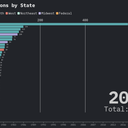
Historical trends in executions and new death sentences closely track changes in public attitudes about the death penalty and crime in general, according to a comprehensive University of North Carolina analysis of national public opinion surveys on the death penalty.
UNC-Chapel Hill Professor Frank Baumgartner has created a statistical index of public support for capital punishment based upon the results of 488 national surveys on the death penalty over the last 40 years. This index documents the close relationship between steep nationwide declines in executions and new death sentences and the historical declines in public support for the death penalty.
Baumgartner says the public opinion polls show that support for the death penalty and for punitive criminal justice policies in general have declined substantially since 1976. He observes that “The number of death sentences tracks closely with public opinion toward that form of punishment.… As the public has increasingly spurned the death penalty, death sentences have also declined.”
Baumgartner’s study also shows that the number of counties and states carrying out executions, as well as the number of executions and new death sentences, have all declined in a pattern closely tracking the drop in public support. He concludes, “No matter how we look at it, for the past 20 years, the death penalty has been dying.” (Click to enlarge image.)
Baumgartner sees a correlation between fading public support for punitive crime measures and the changing politics of criminal justice issues. He predicts that the political climate on the death penalty will also shift: “The death penalty is still regularly used in few places in the United States — because just as with mass incarceration, the public no longer favors it…And where public opinion goes, political leaders eventually catch up.”
F. Baumgartner, E. Williams, and K. Johnson, Americans are turning against the death penalty. Are politicians far behind?, Washington Post, December 7, 2015.



